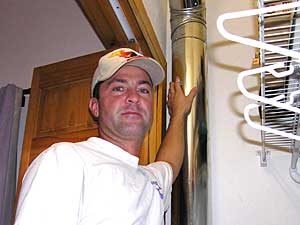|
Photos
|
January 21, 2005
During Minnesota's frigid winters, the demand for electricity rises. In the 1970s, some electric companies began managing those peak use periods with a program commonly known as ripple, or off-peak. The program is voluntary. It's designed for people who have a reliable back-up heating system. Willing homeowners allow the electric company to shut off their electric heat during peak periods. In exchange, off-peak customers pay significantly lower rates for electricity.
Bemidji, Minn. — For decades, off-peak customers in northwestern Minnesota and eastern North Dakota barely noticed when their electric heat was turned off. It didn't happen that often. But in the past few years, the number of shut-off hours has skyrocketed. That's leaving some homeowners shivering. In cold states like Minnesota, most newer homes are typically built with a duel heat system. Often, it's electric heat backed up with a natural gas furnace. That's ideal for customers of the cost-saving, off-peak heat program. When the electric company shuts off their heat, the natural gas back-up kicks on and their homes stay warm.
But many older homes rely on fire places or wood stoves as backup heat. That kind of heat doesn't circulate well. And it requires regular tending.
Nick Weckman who lives east of Bemidji has been an off-peak customer for years. His electric bills are nearly half of what they would be otherwise. Weckman says it worked fine for him until a few years ago when his local electric cooperative began shutting off his electric heat for hours at a time.
"When you can see your breath, you know it's cold in your house," Weckman says. "We'd come home and our house would be 40 degrees... Basically, you sit in one room where we have the fireplace, you know. Basically, live out of that room until either the heat kicks on or until the wood stove temperature gets the house going. That's about all you can do."
Weckman got tired of being cold so a few weeks ago, he spent about $7,000 to install a natural gas furnace. It meant he had to cut holes in floors to run ductwork throughout the house. Weckman says the hassle was worth it.
"In our view, every day that we come home we smile, because our house is at a constant temperature," says Weckman. "I would recommend it to anybody. To me, I don't care what the cost is, as much as coming home and having a heated house."
But not everyone is willing or able to spend big money to upgrade their back-up system. They're bundling up with sweaters and blankets, waking up to cold toilet seats, and occasionally skimming ice from the dog's water dish.
Electric company officials say that's not the intent of the off-peak heating program. Sam Mason with Beltrami Electric Cooperative in Bemidji, stresses the program is voluntary.
"Our goal here at Beltrami Electric is that people are comfortable, that they're using the system to save dollars on the energy costs in their home, but that they're not sacrificing comfort to do that," Mason says. "But are there ones out there who may (sacrifice comfort)? Yes, I think there are."
Beltrami Electric Cooperative is part of Minnkota Power, an association that serves more than 100,000 customers in eastern North Dakota and northwest Minnesota. For years, Minnkota off-peak customers typically had their electric heat shut off for around 40 hours over the five month heating season. But the past two years, that number has climbed to around 400 hours.
Power company officials say the reasons for the increase are complex. The Minnkota system can generate only so much of its own power and when it gets cold and the system reaches peak capacity, the company has to purchase surplus electricity from other power generating systems. The problem is, many of the new generation power plants use natural gas. Natural gas has gotten expensive and that drives up the wholesale price of electricity.
Sam Mason of Beltrami Electric says the alternative is to turn off the power to off-peak customers. Mason says that's likely to happen more frequently.
"Load management will continue to be used," Mason says. "The market forces out there that are creating more hours of load management are not going to turn around."
That's probably good news for some. Greg Renner sells heating systems for a company in Bemidji. Renner says business has picked up since the electric company increased its off-peak hours. More people are buying gas fireplaces, thermal storage units or back-up furnaces.
"The last cold spell that we had we have people that call up and say, 'hey, have you got a heater that I can fill in this gap or heat this area?' Renner recalls. "People calling up, 'I need something yesterday, because I'm cold here today... My existing heating system isn't doing it.'"
Officials with Minnkota Power say their off-peak system allows the company to offer some of the lowest residential electricity rates in the country. But they project that in coming years, shut-off time for off-peak customers could increase to as much as 700 hours each winter.





